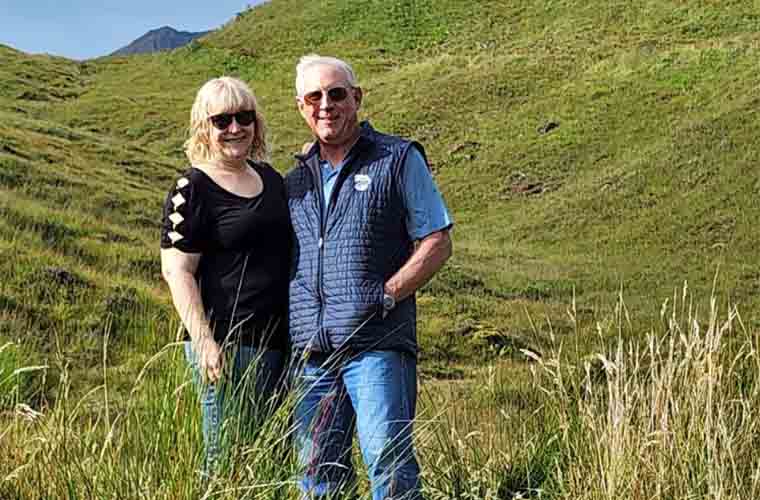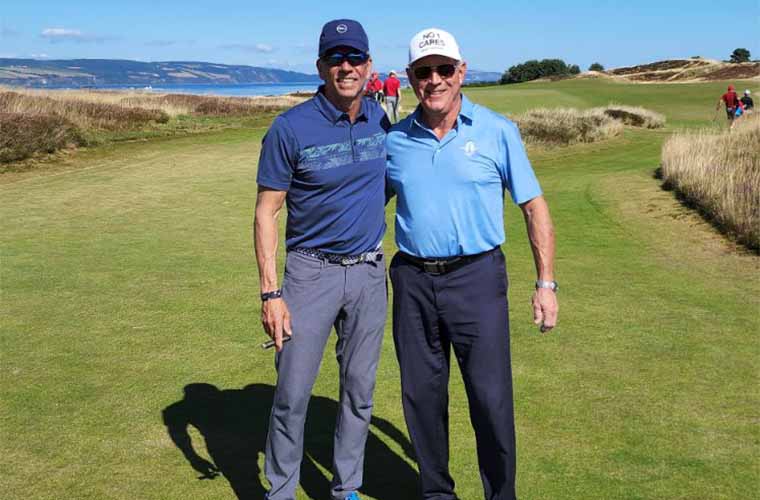At Morton Plant Hospital's Lung Nodule Clinic, Early Detection Saves Lives

When 66-year-old Al Parker rang in 2023, he felt fine. He had no idea he was sick, much less had cancer. He had never heard of Morton Plant Hospital’s lung nodule clinic because he hadn’t needed its services.
As the year draws to a close, Parker sings the praises of physicians and clinicians at the lung nodule clinic and throughout BayCare because, unknowingly, he began the year with lung cancer, but now, he is cancer free.
The multidisciplinary team of medical experts at MPH’s lung nodule clinic work together to identify lung cancers early and quickly get patients the care they need.
“We created the lung nodule clinic four years ago to meet the need we see from patients who are diagnosed too late,” said pulmonologist Joseph Romero, DO, the lead physician at the lung nodule clinic. “We know that early diagnosis and treatment change outcomes for those diagnosed with cancer, and that is our goal.”
Parker’s BayCare Journey
Parker’s journey to the lung nodule clinic began with his annual visit to his BayCare Medical Group cardiologist Georges Dagher, MD. Parker began seeing Dr. Dagher several years ago after a leg wound wouldn’t heal.
Dr. Dagher told Parker everything looked good, and nothing indicated a need for a stress test. However, he recommended a CT scan of Parker’s heart.
“I went to BayCare Imaging in Trinity,” Parker said. “The scan showed I had a blocked artery, but my lungs were in the background of scan. It showed a nodule.”
Dr. Dagher’s office called with the results of the scan. Parker was told he needed a stent to take care of the blocked artery first. Then, the lung nodule would be addressed.
Five days after having the stent, Parker, who loves to golf, was back on the golf course, but he still needed to have the lung nodule checked out.
His primary care physician, Matthew Irvin, MD, ordered a PET scan to check his lungs. “They told me if the number is 2.5 or higher, it is cancer, and under 1.5, it is not. Mine was 1.8,” said Parker.
After seeing the PET scan results, Dr. Irvin, whose office is in Palm Harbor, referred Parker to Morton Plant’s lung nodule clinic.
The next day, Parker received a call from Debbie Ellis, the lung nodule clinic coordinator. From that day, she took over the scheduling and coordinating of appointments for him.
She made an appointment for him to see one of the clinic’s doctors Shea Eckardt, MD.
Dr. Eckardt presented the case at Morton Plant’s cancer conference, a weekly meeting where surgeons, pulmonologists, radiologists, pathologists and oncologists review patient cases and discuss their observations to determine the best treatment plan. The conference recommendation was to biopsy Parker’s lung nodule.
Dr. Romero did the biopsy using ION robotic-assisted bronchoscopy and had the results for Parker within two days.
“The ION allows us to biopsy smaller nodules, so we can find cancer earlier or rule out malignancy,” Dr. Romero explained.
The biopsy showed Parker had cancer. Ellis scheduled surgery with cardiothoracic surgeon Michael Kayatta, MD, who removed a small section of Parker’s left lung.
“We use robotic-assisted instrumentation for most of our patients, including Mr. Parker. This dramatically reduces pain and recovery time, accelerating the timeline for our patients to return to normal activities,” Dr. Kayatta said.

Parker’s Outcome
Parker was discharged the next day and quickly returned to his normal activities, including playing golf. His margins were clear, and he needed no further treatment.
“I am so thankful that everything fell perfectly into place. If I had done the stress test, I would have had the stent but no CT scan. The nodule would still be growing in my lung,” said Parker.
The lung nodule clinic’s processes work to make the experience easy for patients. Ellis schedules all the appointments and is always available to answer questions.
“She even called me and directed me into the office for my first visit,” Parker said. “The fact that she did everything, and I didn’t have to worry about calling and scheduling was worth its weight in gold.”
Lung Cancer Screening Recommendations
November is Lung Cancer Awareness Month, providing the opportunity to focus on the importance of early detection. The U.S. Preventative Services Task Force recommends yearly lung cancer screenings with low-dose CT scans for anyone who has smoked for 20 or more years, or smokes now or has quit in the past 15 years and is over the age of 50.
Parker did not meet those criteria. He had smoked for 10 to 15 years but had quit more than 30 years ago.
Fortunately for him, the CT scan of his heart showed the spot on his lungs, and his primary care physician immediately referred him to Morton Plant’s lung nodule clinic.
“Our lung nodule clinic team has seen more than 90 patients this year. We are dedicated to removing barriers and helping our patients quickly get the treatment they need to save their lives,” Ellis said.
BayCare offers lung cancer programs with the multidisciplinary approach and robotic technology to assist in early detection of lung cancer at Morton Plant Hospital in Clearwater, St. Joseph’s Hospital in Tampa and St. Anthony’s Hospital in St. Petersburg Robotic technology to assist in the early detection of lung cancer is also offered at all three of those hospitals. Learn more about BayCare services to fight lung cancer.
